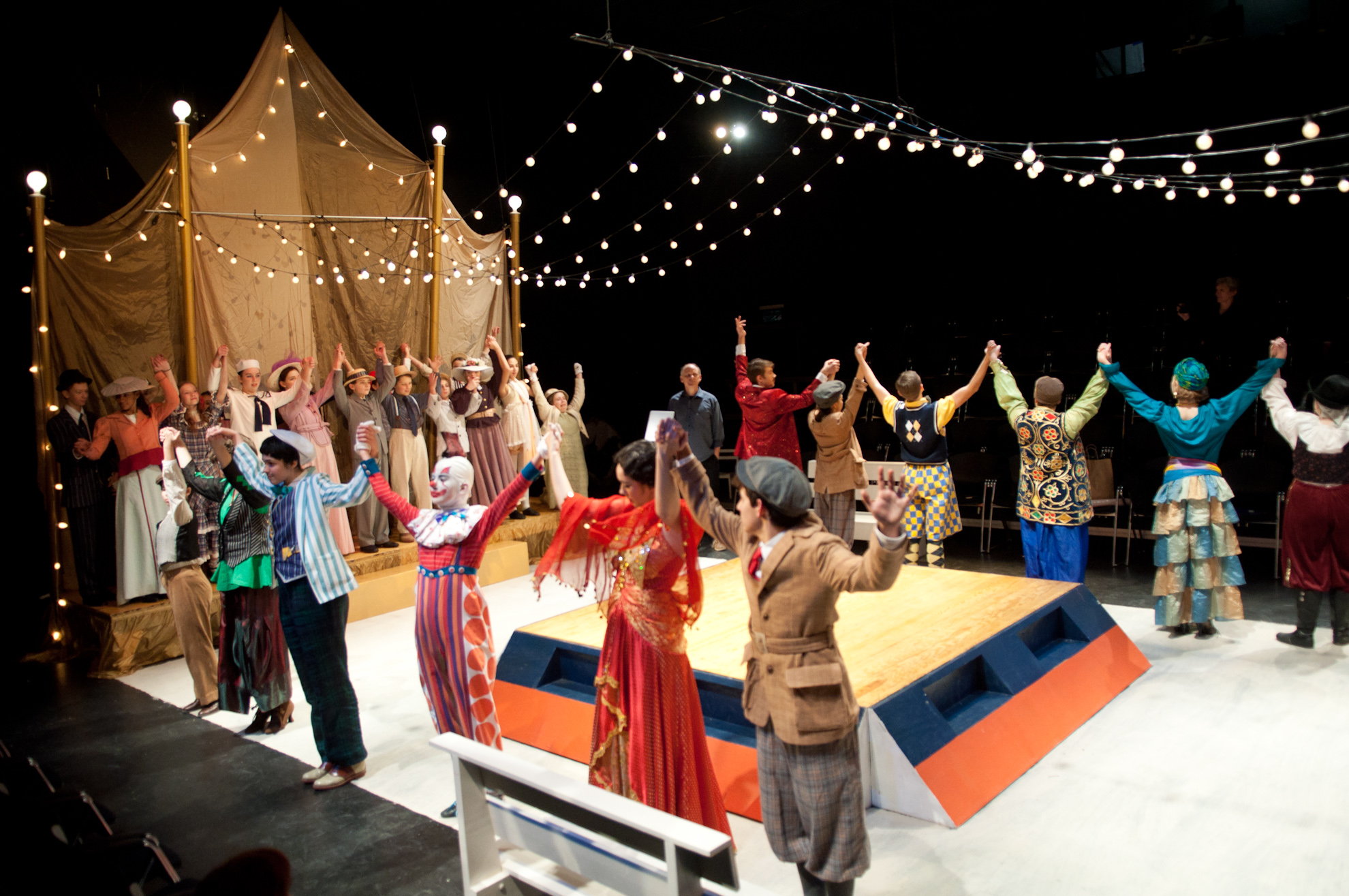David Minton is shaping tomorrow’s actors by familiarizing them with the greatest plays in the English language. As artistic and executive director of Silver Spring-based Lumina Studio Theatre, he works with young actors from elementary through high school to create demanding yet fulfilling productions of some of the Bard’s most remarkable works. And when not practicing, he said, these students keep their noses in the writings of acting teachers Stella Adler and Michael Chekhov.
“We do really meet a high standard,” Minton said. “Because this is really a conservatory program, some [actors] have been with us since they were 8 years old, so by the time they get to be 16, they’ve done eight or more Shakespeare plays on stage in a variety of configurations.”
Lumina will be staging what Minton calls Shakespeare’s last “true fun” comedy, “Twelfth Night,” at the Silver Spring Black Box Theatre, with two rotating casts of student actors during its two-weekend run from Dec. 6 to 15.
Minton believes that “Twelfth Night,” with its screwball antics of mistaken identity and gender-bending love stories, is ideal for an ensemble cast since there are no “glory parts.” Therefore, all the young thespians must create an engaging experience for audiences together.
“Shakespeare is borrowing a bit from his earlier play, ‘A Comedy of Errors,’ in that we have mistaken identity. We have identical twins who have no idea they are in the same place at the same time,” Minton said of the 1623 work. “So, already, it’s kind of set up as a screwball comedy.
“But the language is so beautiful because this is Shakespeare at his peak. He was [then] a mature writer, very successful.”

Under Minton’s direction, Lumina’s version of “Twelfth Night” takes place at an amusement park boardwalk circa 1910, with turn-of-the-century costumes and carnival lighting to match. However, the dialogue is pure Bard.
“This comedy has been explored in so many different ways, it’s always a director’s call to set it in period,” he said, adding that as long as the shipwrecked Viola and Sebastian have a shoreline to walk onto at the show’s beginning, it can theoretically be transferred from Old Europe to any shoreline. (The play’s fictional Illyria has been reimagined as the Atlantic City-like “Illyria Land.”)
“I wanted to set it in during a time when there was less disagreement about what America was,” Minton said. “America at the turn of the [20th] century was definitely feeling its power — for some people, not everybody. This was pre-World War I; there was a lot of hope that America was growing.”
There were no cell phones or streaming videos. Thus, entertainment was experienced communally, mostly as group outings to fairs and carnivals. Minton said he was partially inspired to set “Twelfth Night” at a carnival due to his own experiences growing up in Petersburg, Virginia. A big outing for his family was to Virginia Beach to see the vacation town’s seaside amusements.
“Growing up during the ’60s, your entertainment choices were kind of few,” Minton said, adding that carnivals were “the great gathering of all sorts of people from many different classes — a great melting pot of fun.”
This very seaside carnival setting, Minton said, allowed him to set up several boardwalk “sideshows” in his staging. Accordingly, one booth features actors enacting a melodramatic version of “Antony & Cleopatra,” a work Minton said was always ripe for parody.
“That’s the end of the first act: Our younger group does that ‘Antony & Cleopatra’ as a sideshow entertainment very badly, kind of the art of coarse acting,” he said. “So we toggle between sides of the stage, and we have a raised platform in the middle where we also do some action speeches.
“The great divide of the play is you have Orsino’s court, and you have Olivia’s court. And never the twain meet until the very end of the play with people running back and forth as messengers and lovers. So, the ‘traverse style’ works really well for this play because you do have that of back and forth throughout the play.”
Furthermore, setting the comedy more than a century ago — before women won the right to vote in 1920 — lends the gender-swap nature of “Twelfth Night” an extra level when Viola disguises herself as a boy. (In Elizabethan England, all female roles were portrayed by men.)
“In Shakespeare’s time, it would be [unusual] for a woman to be walking around unchaperoned in certain situations,” Minton said, let alone on stage. “Even in the early 1900s, it was the same thing.”
The Silver Spring Black Box Theatre allows Minton to fashion his turn-of-the-century carnival in a way that he can simply remove the fourth wall and allow the audience to enter the comedy, and soon enough forget they are hearing 17th century dialogue in a 20th century setting.
“We’ve done a variety of stage configurations at Silver Spring Black Box Theatre,” he said, adding that the venue has worked well for other Shakespeare works staged there, including “Coriolanus.”
“But for several of our plays, one of my favorite configurations is what I would call ‘traverse’ or ‘alley’ theater, where you have the audience on two sides. And it works really well in the Black Box.

“With this setting, I decided to create two backdrops, one on each side,” Minton said, one an arcade featuring a second story showing photographs of Coney Island in its heyday. “Then on the other end of the alley, we created a wonderful harem-type tent where one of the sideshow acts” is staged.
Minton said that directors over the years have often envisioned “Twelfth Night” as a more melancholy story, with Viola and Sebastian each believing the other dead at the outset, but Minton believes that even such a theoretically dark beginning allows ample room for laughs. “There’s definitely a serious middle to the play, but a lot of it is guessing who’s going to be in love with whom and who is going to be successful in love. Shakespeare is asking ‘what is real love?’” Minton said, echoing Orsino’s famous line from early in the show: “If music be the food of love, play on.”
“[Orsino] is obviously in love with love, but he doesn’t know what love is. And Viola teaches him a little bit about getting to know somebody and getting to like them for who they are. I think that message still rings true.”
Even though his actors are young, Minton said they strive to deliver a high-caliber performance. “Of course, we know they’re young, they’re not professional yet, but they do strive for it and give it their best,” he said. “We try to deliver a performance that is as professional as can be.”
Lumina Studio Theatre presents “Twelfth Night” at 7 p.m. Fridays, Dec. 6 and 13; 1 and 7 p.m. Saturdays, Dec. 7 and 14 and 1 p.m. Sundays, Dec. 8 and 15, at the Silver Spring Black Box Theatre, 8641 Colesville Road, Silver Spring. For tickets — $15 to $18 (plus service charge)— visit www.brownpapertickets.com/event/4401067 or www.brownpapertickets.com/event/4401081. Call 301-565-2282 for information.